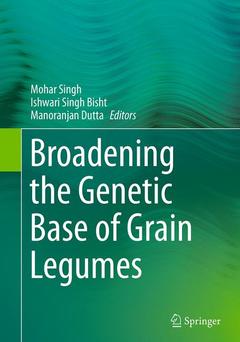Description
Broadening the Genetic Base of Grain Legumes, Softcover reprint of the original 1st ed. 2014
Coordinators: Singh Mohar, Bisht Ishwari Singh, Dutta Manoranjan
Language: English
Keywords
Publication date: 08-2016
Support: Print on demand
Publication date: 11-2014
215 p. · 17.8x25.4 cm · Hardback
Description
/li>Contents
/li>Biography
/li>Comment
/li>
1. Introduction.- 2. Common bean.- 3. Chickpea.- 4. Faba bean.- 5. Cowpea.- 6. Lentil.- 7. Pigeonpea.- 8. Groundnut.- 9. Vigna species 10. Horsegram
Dr. Mohar Singh is presently working as a Senior Scientist (Plant Breeding) at the National Bureau of Plant Genetic Resources Pusa, New Delhi India. Dr Singh obtained his Doctoral degree in Plant Breeding from the Himachal Pradesh Agricultural University, Palampur, India in 2001. He has been working on genetic and genomic resources of pulses for the last 12 years. Presently, he is working on pre-breeding and genetic enhancement for breaking yield barriers in lentil and chickpea. He has identified several useful gene sources for various trait of interest in wild Cicer and Lens species and some of them have been introgressed into the cultivated background for widening the gene pool. Dr Singh has published more than 50 research papers in the journals of national and international repute like Plant Breeding, Crop Science, PLoS ONE, DNA Research, Journal of Agricultural Science, Journal of Genetics and Breeding, Genetic Resources and Crop Evolution, Plant Genetic Resources: Characterization and Utilization and Adv Hort Science and also authored two text books and one edited published by Elsevier Insights.
Dr. Ishwari Singh Bisht is working as a Principal Scientist at the National Bureau of Plant Genetic Resources (ICAR), Pusa Campus, New Delhi. As Professor of Plant Genetic Resources (PGR) discipline of Postgraduate School, Indian Agricultural Research Institute (a deemed university), he also coordinates the postgraduate teaching & research of the discipline. Dr. Bisht has been actively associated with various agro-biodiversity management issues being addressed at the national level including crop genetic resources exploration, collection, characterisation, conservation, germplasm enhancement, etc. He has been working in the field of plant genetic resources management for over 30 years and his academic achievements in this area have been widely recognized nationally and internationally. Dr. Bisht’s research mainly focuses on a thorough understanding of the
An updated and informative contribution to the field of cereal breeding
Includes information on all the major cereal crops, from maize to sorghum to rice
Comprehensively describes genetic diversity, breeding methods and techniques and integration of new biotechnology applications
These books may interest you

Grain Legumes 242.64 €



